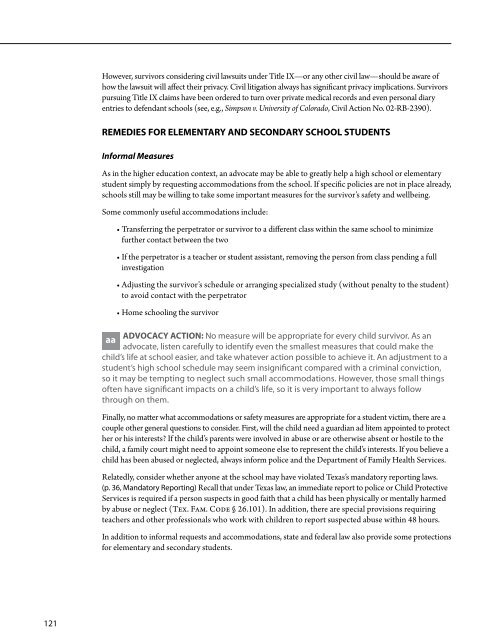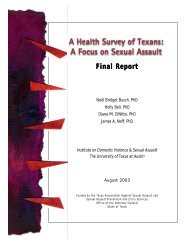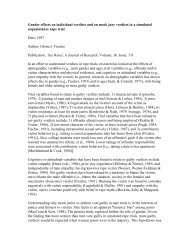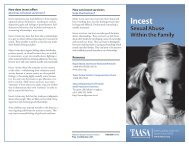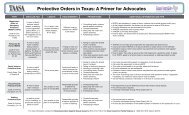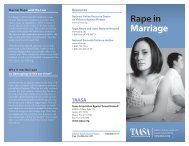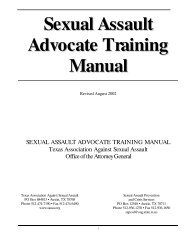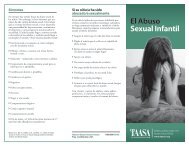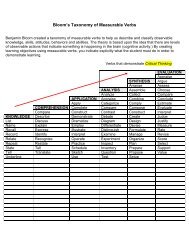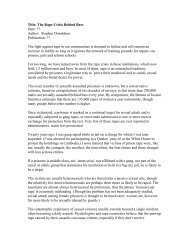Sexual aSSault LEGAL ADVOCACY MANUAL - Texas Association ...
Sexual aSSault LEGAL ADVOCACY MANUAL - Texas Association ...
Sexual aSSault LEGAL ADVOCACY MANUAL - Texas Association ...
You also want an ePaper? Increase the reach of your titles
YUMPU automatically turns print PDFs into web optimized ePapers that Google loves.
However, survivors considering civil lawsuits under Title IX—or any other civil law—should be aware of<br />
how the lawsuit will affect their privacy. Civil litigation always has significant privacy implications. Survivors<br />
pursuing Title IX claims have been ordered to turn over private medical records and even personal diary<br />
entries to defendant schools (see, e.g., Simpson v. University of Colorado, Civil Action No. 02-RB-2390).<br />
Remedies for Elementary and Secondary School Students<br />
Informal Measures<br />
As in the higher education context, an advocate may be able to greatly help a high school or elementary<br />
student simply by requesting accommodations from the school. If specific policies are not in place already,<br />
schools still may be willing to take some important measures for the survivor’s safety and wellbeing.<br />
Some commonly useful accommodations include:<br />
• Transferring the perpetrator or survivor to a different class within the same school to minimize<br />
further contact between the two<br />
• If the perpetrator is a teacher or student assistant, removing the person from class pending a full<br />
investigation<br />
• Adjusting the survivor’s schedule or arranging specialized study (without penalty to the student)<br />
to avoid contact with the perpetrator<br />
• Home schooling the survivor<br />
<strong>ADVOCACY</strong> ACTION: No measure will be appropriate for every child survivor. As an<br />
advocate, listen carefully to identify even the smallest measures that could make the<br />
child’s life at school easier, and take whatever action possible to achieve it. An adjustment to a<br />
student’s high school schedule may seem insignificant compared with a criminal conviction,<br />
so it may be tempting to neglect such small accommodations. However, those small things<br />
often have significant impacts on a child’s life, so it is very important to always follow<br />
through on them.<br />
Finally, no matter what accommodations or safety measures are appropriate for a student victim, there are a<br />
couple other general questions to consider. First, will the child need a guardian ad litem appointed to protect<br />
her or his interests? If the child’s parents were involved in abuse or are otherwise absent or hostile to the<br />
child, a family court might need to appoint someone else to represent the child’s interests. If you believe a<br />
child has been abused or neglected, always inform police and the Department of Family Health Services.<br />
Relatedly, consider whether anyone at the school may have violated <strong>Texas</strong>’s mandatory reporting laws.<br />
(p. 36, Mandatory Reporting) Recall that under <strong>Texas</strong> law, an immediate report to police or Child Protective<br />
Services is required if a person suspects in good faith that a child has been physically or mentally harmed<br />
by abuse or neglect (Tex. Fam. Code § 26.101). In addition, there are special provisions requiring<br />
teachers and other professionals who work with children to report suspected abuse within 48 hours.<br />
In addition to informal requests and accommodations, state and federal law also provide some protections<br />
for elementary and secondary students.<br />
121


